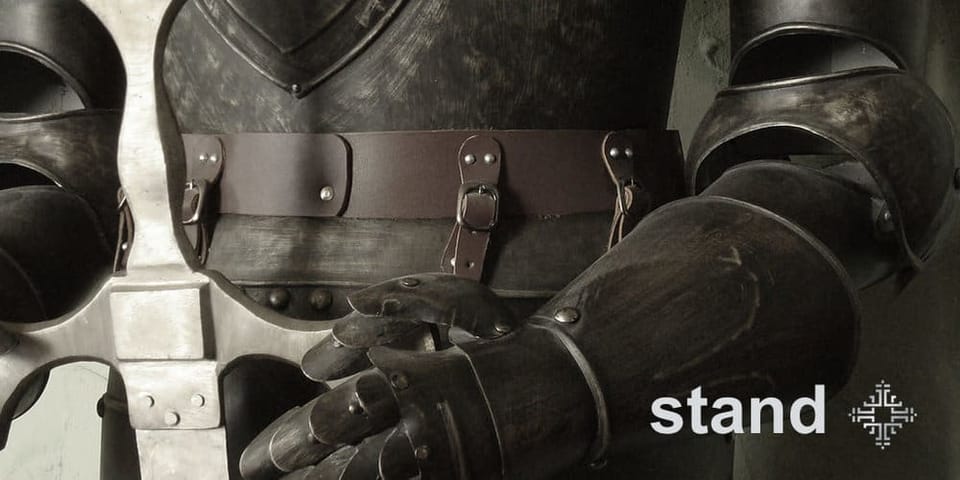The Shield of Faith (Ephesians 6:16)

Big Idea: Defend yourself from Satan’s attacks by trusting, at a practical level, what’s true about God.
Four years ago, we began one of the biggest trials in our lives. There was little warning. Out of nowhere, our lives were turned upside-down. I thought that I would be doing great things for God, but found that it was a good day when I could get out of bed, survive the day, and go to bed again at night. The trials continued like that for the better part of a year, and we are still occasionally dealing with parts of that pain.
What do you do when it feels like you’re under attack and you can barely survive? I’m talking about things like temptations, fear, oppression, doubt, despair, discouragement, worry, as well as external events that cause you to want to give up. When you’re under attack, and you want to give up, we need some defense. Today I want to look at a great defense that’s been given to us.
The passage before us tonight says:
In all circumstances take up the shield of faith, with which you can extinguish all the flaming darts of the evil one… (Ephesians 6:16)
So I want to look at what the shield of faith is, why we need it, and how we can use it.
First, let’s look at what the shield of faith is.
If you’ve seen movies about Roman warfare, you’ve probably seen a Roman shield formation. There were two kinds of shields. One was a small, handheld one. The other — the one that Paul is talking about — was larger, almost as big as a door. It was usually about 4 feet high and 2 feet wide. It was typically made of two layers of laminated wood, and then covered with linen, and then with hide. It was bound at the top and bottom with iron, and then it had an iron ornament on the front. It was big enough that you could crouch behind it and be completely protected.
The beautiful thing is that happened when soldiers used these shields in formation. Soldiers would stand together and hold their shields to create a wall of shields in front of them, beside them, and on top of them. They could then advance against the enemy and advance, even when under attack. The shields offered protection, and allowed the soldiers to advance even when they were being bombarded with missiles.
The apostle Paul tells us in this passage to take up our shields, which he calls the shield of faith. So what Paul is saying is that faith is our defense when we’re under attack. Faith is what will protect us when missiles are coming at us. Faith is what will help us advance even when we’re under attack. If we’re going to survive the attacks that are coming at us, then we need faith.
So what is faith? It’s important that we understand what faith isn’t. One theologian said that faith is the most misunderstood word in the religious vocabulary, and I think he may be right. Faith isn’t hoping or wishing. Faith isn’t believing something that is true even though it may not be. When you apply for a job and you’re pretty sure that you didn’t get it, somebody may say to you, “You’ve got to have faith!” That’s not what the Bible is talking about when it talks about faith. That kind of faith will never be a defense. When you’re under attack, wishing that something is true will never give you the defense that you need.
When the renowned missionary John Paton was translating the Scripture for the islanders in the South Pacific, he found there was no word in their vocabulary for believe or faith. He had no idea how to communicate it to them since they didn’t have a word for it. One day he was working in his hut translating, and a local came running in and just flopped himself in a chair. He said to Paton, “It’s so good to rest my whole weight in this chair.” John Paton said, I have my word. Faith is resting your whole weight on God. That became the word that he used in his translation, and that brought many of those people to faith in Christ. Faith is putting your whole weight in God, and saying that if he said it, then it’s true, and I’ll believe it.
Here’s how John Piper defines faith. “The essence of faith is being satisfied with all that God is for us in Christ.” It’s not just an assent to truths. It’s a “heartfelt valuing and treasuring of all that God promises to be for us in Jesus.” I like that.
Let’s put all of that together and say this: Faith is putting all our weight in what God has done for us through Jesus Christ. It’s believing what God says is true of us, but it’s more than that. It’s laying hold of what God says is true of us — all his promises and resources, along with who he says we are in Jesus — and living out of that reality. That’s what the shield of faith is.
I remember watching a movie about a Roman battle scene. When the Roman soldiers made their shield formation, I thought, “Those other guys don’t have a chance.” Their defense were impregnable. They were able to advance, and they were completely protected from enemy attack. Paul says that when we put our full weight in what God’s done for us in Jesus, that’s what we’re like.
So let me remind you what God has done for us in Jesus, so that you can put your full weight in this reality, based on the first few verses of the book of Ephesians:
- He’s blessed us — “Blessed be the God and Father of our Lord Jesus Christ, who has blessed us in Christ with every spiritual blessing in the heavenly places…” This is a summary of everything that God has done for us. His intention for us is completely that of blessing us, giving us what we don’t deserve.
- He’s chosen us — “even as he chose us in him before the foundation of the world, that we should be holy and blameless before him.” If you have put your faith in Christ, it’s because God graciously chose you long ago, before this world even existed. He chose you not because you deserved it, but simply because of his grace.
- He’s predestined and adopted us — “In love he predestined us for adoption as sons through Jesus Christ, according to the purpose of his will, to the praise of his glorious grace, with which he has blessed us in the Beloved.” You’ve been given God’s family name, and have all the rights and privileges of being his child.
- He’s redeemed and forgiven us — “In him we have redemption through his blood, the forgiveness of our trespasses…” You’ve been released from captivity. Your freedom has been purchased by Jesus Christ. Through his sacrificial death, Jesus has made a way for all of your sins to be forgiven.
- He’s lavished grace on us — “according to the riches of his grace, which he lavished upon us…” God isn’t stingy with his grace. He lavishes it on us. He loves to give us more grace than we can imagine.
- He’s made his intentions known to us — “in all wisdom and insight making known to us the mystery of his will, according to his purpose, which he set forth in Christ as a plan for the fullness of time, to unite all things in him, things in heaven and things on earth.” We’ve been given insight into what Gods purposes are for us and for the world.
- He’s given us an inheritance — “In him we have obtained an inheritance…” You will inherit the kingdom of God and the eternal life. They are yours in Jesus.
- He’s sealed us — “In him you also, when you heard the word of truth, the gospel of your salvation, and believed in him, were sealed with the promised Holy Spirit, who is the guarantee of our inheritance until we acquire possession of it, to the praise of his glory.” God has put marked you with his seal. You belong to him, and you’re protected by him. You’re sealed with the Holy Spirit, who lives within you and is a downpayment and a foretaste of what’s coming.
This is just a sample of what God has done for you. One hymn says, “What more can he say than to you he has said?” In other words, what else could God have done for you? God hasn’t held anything back. He’s given us everything that we could ask for, including Jesus Christ.
Paul says that when when we put our weight on all that God has done for us in Jesus, then we are protected just like the soldiers were with their shields. Put your weight on what God has done for you, and you will be able to survive the attacks of the evil one, and even advance when under attack.
Let’s look at why we need the shield of faith.
So why is the shield of faith necessary? Paul says, “In all circumstances take up the shield of faith, with which you can extinguish all the flaming darts of the evil one” (Ephesians 6:16). You’ve probably seen the movies. Ancient soldiers would often dip their arrows in some kind of flammable liquid, and then light it on fire before firing the arrow like a missile. Paul says that this is Satan’s strategy with us as well. Our enemy will launch repeated volleys of blazing arrows at us at every opportunity. Jesus said of Satan, “He was a murderer from the beginning, and does not stand in the truth, because there is no truth in him. When he lies, he speaks out of his own character, for he is a liar and the father of lies “ (John 8:44). 1 Peter says, “Your adversary the devil prowls around like a roaring lion, seeking someone to devour” (1 Peter 5:8). Here’s why you need a shield of faith. Satan is a lying murderer who would love to devour you. He wants to destroy you, and he’ll use any means possible in order to do so.
Thomas Brooks, who lived in the 1600s, did us all a big favor by writing a book called Precious Remedies Against Satan’s Devices. In this book he lists some of the ways that Satan loves to attack us. These are some of the “fiery darts” that he will lob our way every chance that he gets:
- He will try to get us to sin by presenting the bait but hiding the hook, and by making sin look really, really good.
- He will try to get us to ignore the means that God has given us to strengthen our faith, such as prayer, Bible reading, worship, and fellowship.
- He will try to get us into a sad, doubting, questioning, and uncomfortable condition.
- He will get us to believe lies, like that our sins are too great to be forgiven, or that God is unwilling to forgive.
This is a very helpful breakdown of some of Satan’s tactics. There’s nothing really innovative about his approach. He’ll try to get us to sin, to ignore things that will help us, he’ll make us miserable and doubting, or he’ll get us to believe lies about God.
What I want you to see is that these are attacks that you have faced this very week. Maybe even today. Who knew that we were under attack? As I review the past week, I can see that I’ve faced almost all of the attacks that Thomas Brooks described. This is our everyday reality. We’re always under attack.
But we’re not just under attack individually. We’re under attack as a church as well. There are at least three ways that I can think of that churches can come under attack:
- Satan will try to get us to believe false doctrine. He will get us to believe lies about God that will poison our faith. He will inject falsehood any chance he can get. But he’s sometimes more subtle than that. Sometimes he will stop short of getting us to deny the gospel. He’ll settle for getting is to assume the gospel, which is only one step away from actually losing the gospel.
- Satan will try to destroy our unity. Satan loves it when we don’t get along. He knows that all he has to do to stop a church is to get it fighting or gossiping. Even better, he loves it when a culture develops that includes fighting and gossiping. So many churches are stuck here. I was fascinated to read this paragraph from Revivals in Religion:
It is an instructive and solemn fact, brought out in the history of more than one revival, that when a whole neighborhood had been well watered with the showers of grace, no drop of blessing has descended there where a spirit of controversy and strife had obtained a footing. The Spirit of God hovered around but fled from the scene of discord as from a doomed region where his dove-like temper could find no resting-place. Ever remember that “his work is sown in peace of them that make peace,” and no dwelling can be more distasteful, no vessel more unsuitable to him, than a heart which delights itself with matters that provoke contention and strife…. Labor with all diligence to keep your own minds in the peace of God, and in your intercourse and connection with others ever to strive for ‘the things which make for peace. (The Revival of Religion: Addresses by Scottish Evangelical Leaders delivered in Glasgow in 1840)
- Satan will try to get us to settle for maintenance Christianity. Sure, Satan will get us to try to believe false doctrines, and to destroy our unity. But he doesn’t even need to do that. He would love to get us to settle for maintenance-level Christianity, just checking in like we don’t really expect anything to happen, going through the motions. He wants to deaden our hearts without us even knowing about it.
When I look at these forms of attack — making sin look good; ignoring prayer, Bible reading, and fellowship; doubting and questioning God; tempting us to wallow in guilt and shame; believe falsehood; get us annoyed and gossiping about each other; getting us to settle for going through the religious motions — I realize that we’re under attack all the time. In other words, the flaming darts of the evil one are coming our way every single day. That’s why we need the shield of faith.
So let’s look at how we can use it.
Given these attacks, what do we do?
Faith is putting all our weight in what God has done for us through Jesus Christ. This is the shield that we need to “take up” when Satan lobs the darts of doubt, unbelief, and deadness our way. So here’s the essence of what we need to do. When we’re tempted to doubt, disbelieve, grumble, or drift, put all your weight in what God has done for you in Jesus Christ. Remember what’s true about God, and don’t just think about it. Lift up the shield of faith by actually leaning into what you know is true about God.
For instance: What would it look like if we put all of our weight into believing the following truths (from Tim Chester’s You Can Change):
- God is great— so we do not have to be in control. He controls all things, and knows exactly what we need. We can give up our roles as general managers of the universe and trust in his sovereign control. We don’t have to try to manipulate people or circumstances. Even when things seem out of control, we can know that God is working everything out according to his plan.
- God is glorious— so we do not have to fear others. We don’t have to be trapped by our need to win the approval of other people, which can result in being overly eager to please others, being concerned with our self-esteem, being over-committed, telling lies to make ourselves look good, and comparing ourselves to others. We already have all the approval we could ever need. We couldn’t be more accepted in Jesus Christ. We can be free to serve others out of love, rather than out of a sense of earning or inadequacy. We can seek his glory, rather than trying to promote our own glory.
- God is good— so we do not have to look elsewhere. If we look for meaning, satisfaction, and fulfillment anywhere but in God, we’ll be disappointed. Because God is good, we don’t have to look anywhere else for our joy, contentment, security, and satisfaction. Only God can satisfy the desire of every living thing He has created, including you — and he’s happy to, because he’s abundant in love. We don’t need to resort to our idols of food, sex, games, drugs, or laziness, because they’ll never give us what only God can offer our hungry souls.
- God is gracious— so we do not have to prove ourselves. We don’t ever have to earn God’s love when we sin or fall short. We don’t have to worry that God has changed his mind about us, or that we have to jump through hoops to get right with God. We never have to worry about not making the grade, and we don’t have to put others down to feel good about ourselves.
These four truths — God is great, glorious, good, and gracious — are things you may already believe. But what would it look like if we put our weight into these truths about God? When Satan lobbed fiery darts at us, we could value with all of our hearts what we know to be true about God.
How do we raise this shield of faith? Martyn Lloyd-Jones explains it well:
The main art in the matter of spiritual living is to know how to handle yourself. You have to take yourself in hand, you have to address yourself, preach to yourself, question yourself. . . . You must turn on yourself, upbraid yourself, condemn yourself, exhort yourself, and say to yourself: “Hope thou in God”— instead of muttering in this depressed, unhappy way, and then you must go on to remind yourself of God, Who God is, and . . . what God has done, and what God has pledged Himself to do. Then having done that, end on this great note: defy yourself, and defy other people, and defy the devil and the whole world, and say with this man: “I shall yet praise Him for the help of His countenance, who is also the health of my countenance and my God.
It’s not going to be easy, but we all need to do this. We need each other to do it for us. Preach to yourself. Remind yourself of God. Arrange your life so that you’re in the path of grace as much as possible — reading Scripture daily, praying, fellowshipping with others. Know where you’re vulnerable. And look to God, who will grant you the strength that you need. Then put your whole weight in what we know to be true about God.
Remember the Roman shield formation? It’s one thing to be a single soldier with a shield. Something much better happens when we come together with faith. As we create a shield-wall of faith, we’ll be able to advance even when we’re under attack. That’s what I want for us as a church.
William Gurnall, the English puritan who wrote the definitive book on the armor of God, give us this advice:
Keep your faith ined consciousness where his shield was.
You’re not going to get out of here today without a fiery dart coming your way. The moment we drop our shields, those darts can do great damage. But here’s the flip side: “No battle was ever planned by hell’s most gifted strategist which can conquer faith. All its inflamed and terrible darts fall harmless as they strike against the shield of faith” (E.M Bounds).
Defend yourself from Satan’s attacks by trusting, at a practical level, what’s true about God.
Where are you being attacked? What fiery darts are coming your way? What truths about God — his greatness, gloriousness, goodness, and graciousness — can you lean into today?





